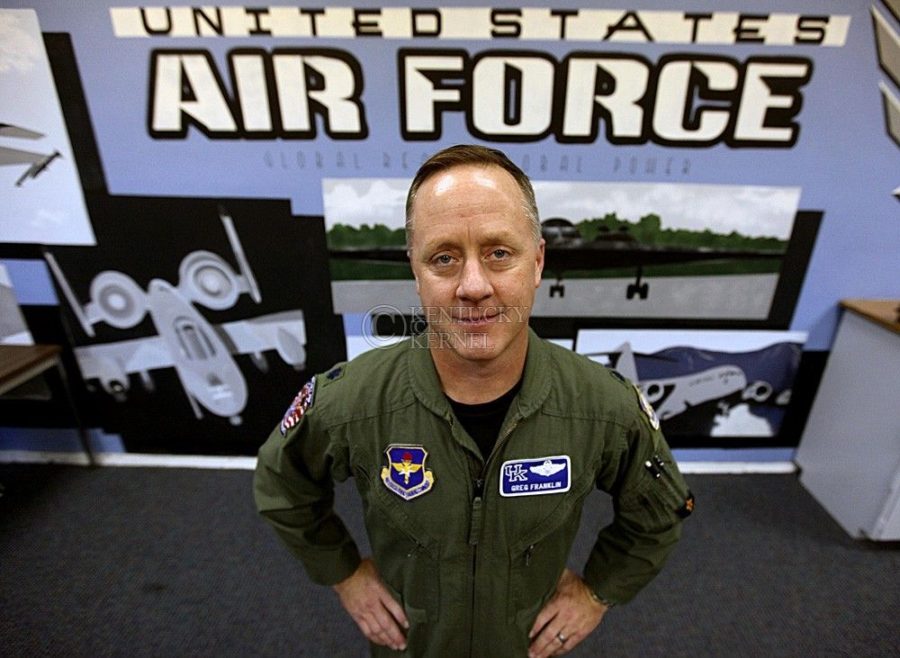For the love of flying: New commander leads Air Force ROTC
Col. Franklin began his term at UK as head of the Air Force ROTC this past summer and will be at UK for the next three years. Tuesday, Nov. 9, 2010. Photo by Britney McIntosh
November 10, 2010
F-16 models and flight helmets adorn the walls of Lt. Col. Gregory Franklin’s large, immaculate office.
“People give you these things, you take them home, and the wife doesn’t like them as decoration, so they come to the office,” Franklin said.
His laughter dissipated the intimidating presence of his office decor, and he looked perfectly comfortable seated in the midst of his profession’s trappings.
“I came from an Air Force family so I grew up doing this,” Franklin, the University of Kentucky’s new Air Force ROTC commander, said.
Franklin’s office reflects his job. He prepares his cadets to be as well-suited to the challenging tasks they will face as leaders in the Air Force as he is to his intimidating office surroundings.
“The mission here is preparing young people to be leaders in the Air Force,” Franklin said.
The trajectory that led Franklin to UK in July began years ago and consists of a series of promotions.
“In the Air Force, you get promoted at regular intervals based on competency,” Franklin explained. “It’s a very rewards based system.”
Franklin joined the Air Force after graduating the ROTC program at Texas State in 1989. Then his top-notch career in the military began.
“I did everything from instructing pilots to flying fighter planes in Alaska and Korea,” Franklin said. He flew F-16 aircraft and served as an instructor, then served for two years at the Pentagon.
He said he was motivated by the opportunity for advancement the Air Force provided.
“It’s really just a rank that allows you to take on more responsibility,” Franklin said. After his stint at the Pentagon, he said he had “the rare opportunity to fly F-15 aircraft as an aggressor pilot.”
Franklin’s experience flying F-15 and F-16 aircraft was part of his involvement with a massive training exercise called Red Flag. Red Flag gives recruits a chance to practice flying in a large group with a variety of planes, like they will in combat.
“You can’t just fly into battle having never worked with all of these different planes,” Franklin said. The training exercise occurs four times per year in Alaska and Nevada. Franklin commanded a unit at Red Flag and had the huge responsibility of coordinating planes from across the nation employed for the exercise. He also flew as an aggressor pilot in the exercise, meaning that he simulated the enemy by flying a plane made to look like an enemy aircraft.
Despite his prestigious background in the Air Force, Franklin said he views his new job at UK as a reward.
“I see it as a possibility for me to pass on what I know but also as a reward, because I get to do something I like,” Franklin said.
And what does he like about being at UK?
“I get to be at college and not take any tests,” Franklin joked. He has been impressed with the involvement, leadership and academic accomplishments of the new cadets under his command.
“It’s amazing that the level of quality is so much higher than when I was a cadet,” Franklin said.
His new job at UK is different from some of the jobs he has held in the past.
“When your subordinates are competent expert fighter pilots, it’s extremely easy to do well as an organization,” Franklin said. “The level of performance is off the charts. Cadets are a completely different situation. They are just learning to be competent. They need to learn lessons.”
Franklin is committed to ensuring each cadet learns those lessons. “My goal honestly is to ensure that every cadet that walks through the door that is serious about becoming an Air Force officer has the training and tools to meet that goal.”
Franklin said he can “already see a shift” in the mentality of his freshman cadets to being more driven. He also said that by the middle of the spring semester he will know every cadet by name, and know about their talents and capabilities.
“That’s why I’m here,” Franklin said. “It’s my job to assess their leadership abilities.”
Air Force ROTC enrollment at UK, according to Franklin, is at an all time high.
“To fly planes you don’t need a technical degree,” Franklin said. “I’m a history major.” He said the motivations for his cadets vary, but he hopes “they are in it to do something bigger than themselves.”
Franklin also said the opportunity to fly is a large motivations source for many of his cadets. UK ROTC Maj. Jesse Hedge agreed.
“There is no question that many of our cadets are drawn to the Air Force with the goal of flying pointy nose jets,” Hedge said. “Lt. Col. Franklin can share that experience first-hand. While some cadets want nothing more than to fly jets, others want to keep their feet firmly planted on the ground.”
But for Franklin, a career in the air offered something no vocation other could.
“It’s ultimate freedom,” Franklin said.
































































































































































